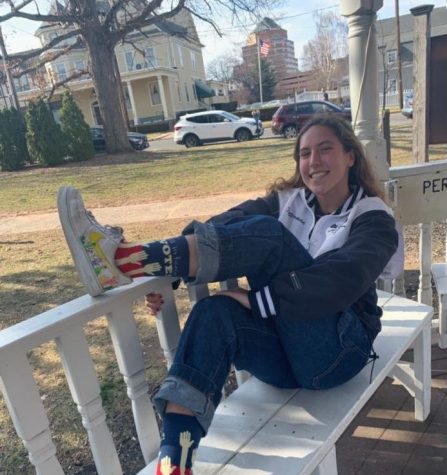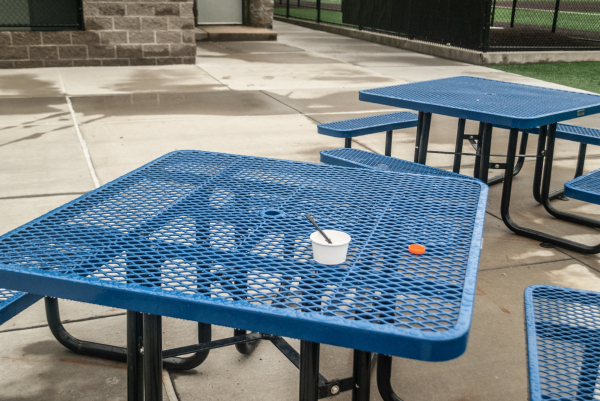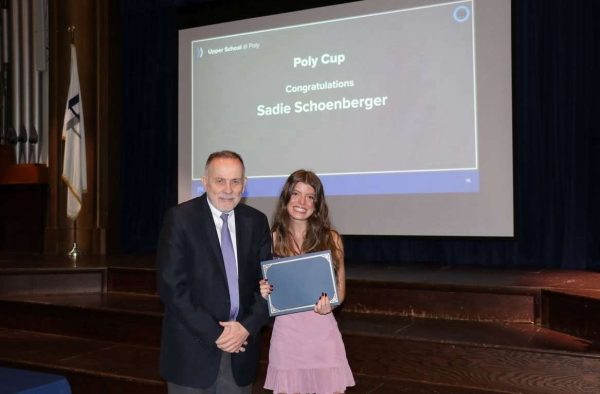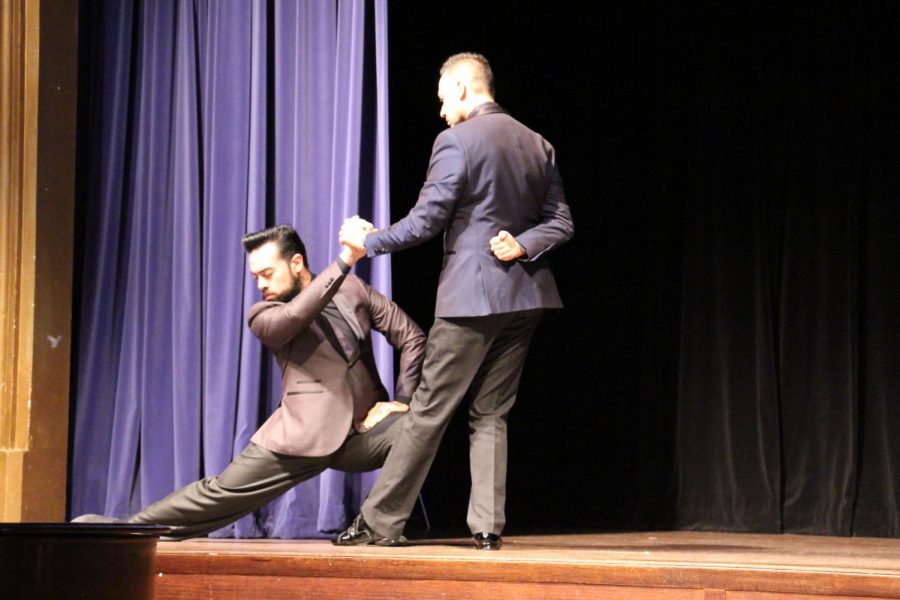Poly Celebrates Hispanic Heritage Month
More News to Read
Tango dancers Walter Perez and Leonardo Sardella perform at Upper School Chapel on October 5th, 2018.
Hispanic Heritage Month, celebrated every year since 1988, exposes the United States to how multifaceted Hispanic culture is, and challenges existing stereotypes of Hispanic people.
According to the US House of Representatives: History, Art, and Archives, it began as merely a week in 1968 but was ultimately expanded to a month in 1988. Hispanic Heritage Month begins September 15th as a way to celebrate the anniversary of the independence of Costa Rica, El Salvador, Guatemala, Honduras, and Nicaragua, who all declared independence in 1821. Many other countries in Latin America also have independence days in September. In addition to this, October 12th is the “Dia de la Hispanidad,” or the National Day of Spain, marking Christopher Columbus’ arrival to the North American continent in 1492.
Upper School Spanish teacher Ronald Sarcos said that Hispanic Heritage Month is a “way to raise awareness and to recognize the population that is growing, not only in numbers but also politically, artistically, culturally in this country. It is a way to recognize and celebrate.”
“We can be more political now in this month,” added Upper School Spanish teacher Maite Iracheta. “[People often try to] make this country be a white dream.” However, she said that it’s important to remember that the United States was “inhabited by native tribes and groups” and that a lot of “the territory was Mexican territory.”
The growing hostility under the Trump administration towards the Hispanic Community makes it even more important that this month is properly honored. Poly celebrated in a number of ways. Events were held throughout the month on Wednesdays, and on October 5th, there was an assembly featuring a tango performance.
At the first Wednesday production on October 3rd, Iracheta, along with fellow Upper School Spanish teachers Gabriel Rubinson, and Teresa Calvo Martinos, showed three short films to students and faculty in the Library. This included a Bolivian film called “Abuela Grillo,” an Argentine film called “Relatos Salvajes,” and a Spanish film called “Pipas”. Afterward, there was a discussion regarding the themes of each film and how they related to Hispanic culture. The second Wednesday production was a discussion about the United States’ relationship with Puerto Rico.
The assembly on October 5th was led by Poly’s “Club Unidad” and hosted by Seniors Elena Diaz, Keyna Mecias, and Daniel Wallace and Junior Rebeka Cabrera. It started with an introduction by Iracheta. Following Iracheta, there was a short introduction from Cabrera, who acts as one of the club’s presidents. Cabrera read a short poem about American beauty standards and the difficulty of fitting into predetermined standards as a Hispanic woman.
Cabrera said, “Club Unidad is an affinity group at Poly that focuses on the issues, experiences, and culture of Hispanic/Latinx people—our issues, experiences, and culture… It means a lot to the club as a whole and to me personally to have the opportunity to share our pride and culture with the rest of the Poly community.” The club said that all are welcome to their meetings and thanked the community for being a great audience and for giving them the opportunity to spread their message in Assembly.
After Cabrera, Rubinson introduced the acclaimed tango duo of Walter Perez and Leonardo Sardella, who put a modern twist on the traditional performance. While many people are familiar with flamenco and salsa dance, the sharp movements of tango are less commonly known. Sarcos said that it “opened peoples minds to how multifaceted Latino culture can be.”
Continuing with the arts of the Hispanic Community, Upper School Spanish teacher Jose A. Oliveras read excerpts of his poetry, accompanied by performing arts teacher Simone Ferraresi on the piano and performing arts teacher Carrie Dowell on the violin.
Seniors Juan Santos and Pepe Villamil also presented their works. Villamil shared part of his common application essay about his identity, and how his family celebrates the culture. Although Santos could not attend the Chapel in person, Unidad played a recording of his music.
Santos said, “Hispanic Heritage Month is a great way for students to learn about the Hispanic culture that they are not often exposed to. I also enjoy Hispanic Heritage Month because it expands the horizons of what it means to be Hispanic. When someone says Hispanic, a lot of people often associate the Mexican nationality with it. Having a month dedicated to learning more about the Hispanic culture allows this stereotype to decrease in magnitudes.”
Overall, it is important that both the Poly community and the entire country recognize the way that Hispanic Americans have shaped this country.

Katie Futterman is one of the Editors in Chief of the Polygon. She started writing in freshman year and was the managing editor her junior year. Outside...




























